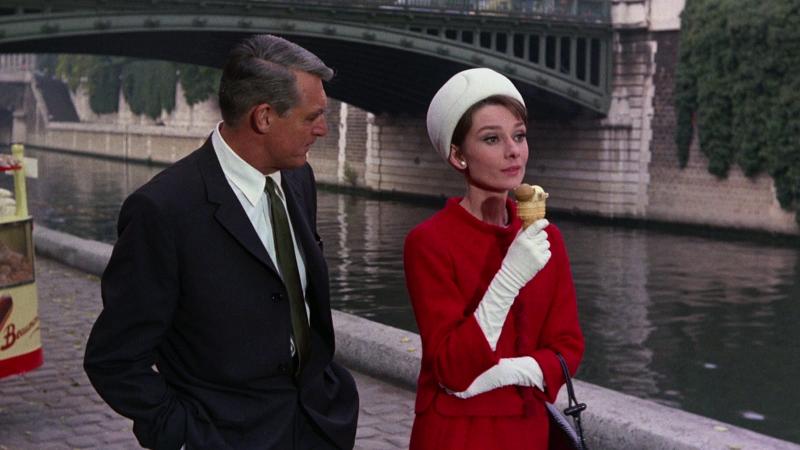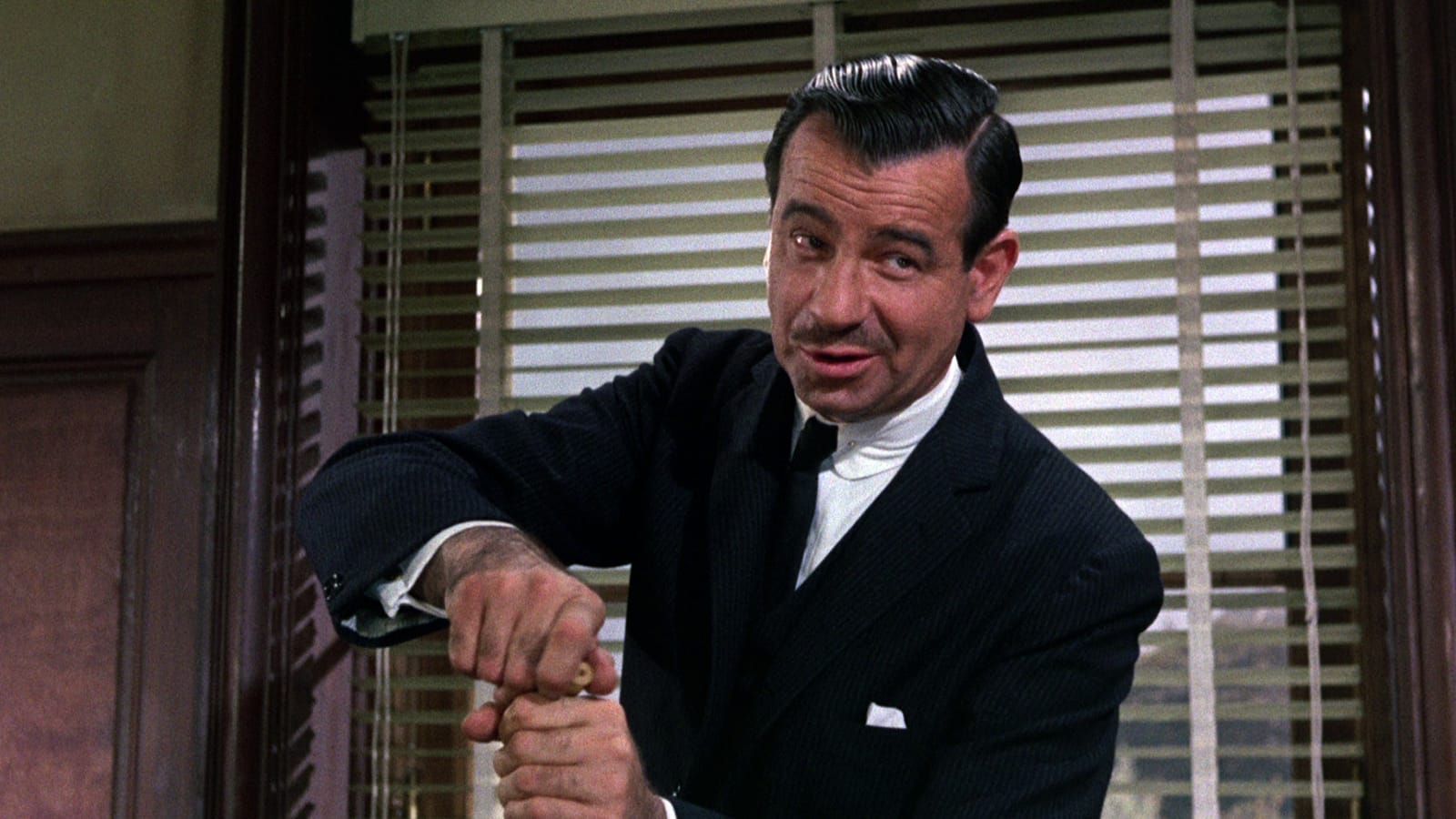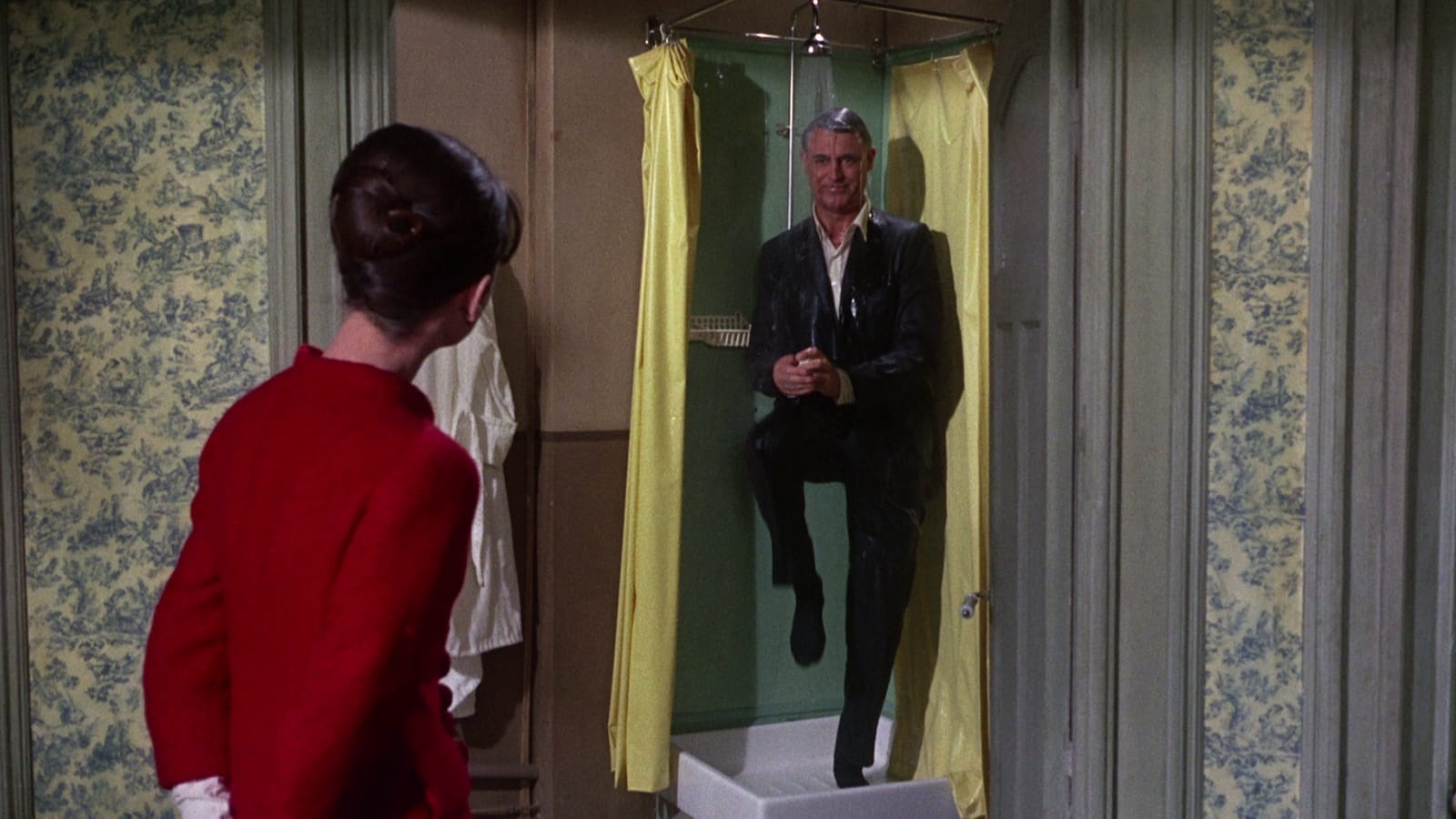Blu-ray: Charade | reviews, news & interviews
Blu-ray: Charade
Blu-ray: Charade
Cary Grant and Audrey Hepburn breeze through a Hitchcockian confection

Audrey Hepburn and Cary Grant in Paris in the summer: Charade was the last word in old Hollywood’s glamorous cool. It was almost the last word for Grant, feeling if not looking his age.
Debutant screenwriter Peter Stone subsequently enjoyed a long career playing with vintage Hollywood properties and Hitchcockian puzzle plots (his last film, the Sean Connery legal thriller Just Cause [1996], still relied on vertiginous revelations). Novelising his own rejected screenplay, more suggestively titled The Unsuspecting Wife, he attracted director Stanley Donen to this “action-adventure comedy with a female lead”.
 Indeed, Hepburn is the lead from the first framing of that lovely face in an Alpine ski resort. As Reggie Lampert, she’s the bored wife of a rich, enigmatic, unpleasant husband, pondering divorce and flirting with a passing Peter Joshua (Grant). Enviably dressed by Hepburn’s friend Givenchy, she is sphinx-like and brittlely funny, baffling men such as Jacques Marin’s hangdog policeman and CIA agent Bartholomew (Walter Matthau), who watches mournfully as she snaps his expensive cigarettes during a restaurant tête-à-tête. Matthau (pictured above) is also marvellous, arranging that crumpled face into debonair charm, with his then reputation as a heavy in reserve, and his future stardom’s comic timing.
Indeed, Hepburn is the lead from the first framing of that lovely face in an Alpine ski resort. As Reggie Lampert, she’s the bored wife of a rich, enigmatic, unpleasant husband, pondering divorce and flirting with a passing Peter Joshua (Grant). Enviably dressed by Hepburn’s friend Givenchy, she is sphinx-like and brittlely funny, baffling men such as Jacques Marin’s hangdog policeman and CIA agent Bartholomew (Walter Matthau), who watches mournfully as she snaps his expensive cigarettes during a restaurant tête-à-tête. Matthau (pictured above) is also marvellous, arranging that crumpled face into debonair charm, with his then reputation as a heavy in reserve, and his future stardom’s comic timing.
Donen, who had directed both stars before and was best-known for musicals such as Singin' in the Rain, marshals impish set-pieces. The unmourned Lampert’s blackly comic funeral sees stormy interruptions by his wartime comrades, snaky cowboy Tex (James Coburn), metal-handed heavy Scobie (George Kennedy) and weaselly Gideon (ex-blacklistee Ned Glass), who check he's dead with mirrors and pins. Joshua and Scobie’s sweaty rooftop duel recalls North By Northwest’s Mount Rushmore fight, and Reggie's chase by Joshua atmospherically exploits its Metro location. Violence ups a notch from the Fifties, with Joshua’s shirt bloodily torn from his back, and asphyxiation by plastic bag.
 Charade mimics Hitchcock’s clockwork, but can’t fake the personal paranoia he gave his wronged men and suspicious women. Donen is a lighter director (who recalls Jimmy Stewart’s hayseed drawl in his bantering Blu-ray commentary with Stone). Still, Grant’s mask slips three times, revealing four identities, and after we see him in cahoots with the gang, he lets a lazy, predatory smile spread before embracing Hepburn. Shot over her shoulder, he has hooded eyes. Hitchcock recognised this quality of deception in cinema’s most natural leading man, tapping it in Suspicion (1941) as Joan Fontaine’s possibly murderous new husband, and Notorious (1946), where he exploits Ingrid Bergman to catch a Nazi. Fake charm from Cary is a queasy sight.
Charade mimics Hitchcock’s clockwork, but can’t fake the personal paranoia he gave his wronged men and suspicious women. Donen is a lighter director (who recalls Jimmy Stewart’s hayseed drawl in his bantering Blu-ray commentary with Stone). Still, Grant’s mask slips three times, revealing four identities, and after we see him in cahoots with the gang, he lets a lazy, predatory smile spread before embracing Hepburn. Shot over her shoulder, he has hooded eyes. Hitchcock recognised this quality of deception in cinema’s most natural leading man, tapping it in Suspicion (1941) as Joan Fontaine’s possibly murderous new husband, and Notorious (1946), where he exploits Ingrid Bergman to catch a Nazi. Fake charm from Cary is a queasy sight.
Similarly, Hepburn’s insouciant veneer cracks when she’s cornered by Tex in a phone-booth, her eyes suddenly naked with fear for the first time on-screen. The former starving wartime Dutch waif, like poor, miserable Archie Leach, knew how to do that.
There is meanwhile plenty of screwball banter between the stars (Him: “You should see your face.” Her: “What’s the matter with it?” Him: “Nothing.”). Grant’s oddly grumpy dodging of Hepburn’s advances was due to his unusual self-consciousness for a male star at their age-gap (he was 59, she 34). They’re both so eternally beautiful, he needn’t have worried. Two films later, though, in Walk, Don’t Run (1966), Grant was relegated to matchmaker to dull young leads, and this insecure embodiment of male grace retired.
Stone’s plot keeps Charade moving, but the stars, their wardrobe and the Paris streets keep you looking, perfect in a manner about to vanish.
The future of Arts Journalism
You can stop theartsdesk.com closing!
We urgently need financing to survive. Our fundraising drive has thus far raised £49,000 but we need to reach £100,000 or we will be forced to close. Please contribute here: https://gofund.me/c3f6033d
And if you can forward this information to anyone who might assist, we’d be grateful.

Subscribe to theartsdesk.com
Thank you for continuing to read our work on theartsdesk.com. For unlimited access to every article in its entirety, including our archive of more than 15,000 pieces, we're asking for £5 per month or £40 per year. We feel it's a very good deal, and hope you do too.
To take a subscription now simply click here.
And if you're looking for that extra gift for a friend or family member, why not treat them to a theartsdesk.com gift subscription?
more Film
 Steve review - educator in crisis
Cillian Murphy excels as a troubled headmaster working with delinquent boys
Steve review - educator in crisis
Cillian Murphy excels as a troubled headmaster working with delinquent boys
 Can I get a Witness? review - time to die before you get old
Ann Marie Fleming directs Sandra Oh in dystopian fantasy that fails to ignite
Can I get a Witness? review - time to die before you get old
Ann Marie Fleming directs Sandra Oh in dystopian fantasy that fails to ignite
 Happyend review - the kids are never alright
In this futuristic blackboard jungle everything is a bit too manicured
Happyend review - the kids are never alright
In this futuristic blackboard jungle everything is a bit too manicured
 Robert Redford (1936-2025)
The star was more admired within the screen trade than by the critics
Robert Redford (1936-2025)
The star was more admired within the screen trade than by the critics
 Blu-ray: The Sons of Great Bear
DEFA's first 'Red Western': a revisionist take on colonial expansion
Blu-ray: The Sons of Great Bear
DEFA's first 'Red Western': a revisionist take on colonial expansion
 Spinal Tap II: The End Continues review - comedy rock band fails to revive past glories
Belated satirical sequel runs out of gas
Spinal Tap II: The End Continues review - comedy rock band fails to revive past glories
Belated satirical sequel runs out of gas
 Downton Abbey: The Grand Finale review - an attemptedly elegiac final chapter haunted by its past
Noel Coward is a welcome visitor to the insular world of the hit series
Downton Abbey: The Grand Finale review - an attemptedly elegiac final chapter haunted by its past
Noel Coward is a welcome visitor to the insular world of the hit series
 Islands review - sunshine noir serves an ace
Sam Riley is the holiday resort tennis pro in over his head
Islands review - sunshine noir serves an ace
Sam Riley is the holiday resort tennis pro in over his head
 theartsdesk Q&A: actor Sam Riley on playing a washed-up loner in the thriller 'Islands'
The actor discusses his love of self-destructive characters and the problem with fame
theartsdesk Q&A: actor Sam Riley on playing a washed-up loner in the thriller 'Islands'
The actor discusses his love of self-destructive characters and the problem with fame
 Honey Don’t! review - film noir in the bright sun
A Coen brother with a blood-simple gumshoe caper
Honey Don’t! review - film noir in the bright sun
A Coen brother with a blood-simple gumshoe caper
 The Courageous review - Ophélia Kolb excels as a single mother on the edge
Jasmin Gordon's directorial debut features strong performances but leaves too much unexplained
The Courageous review - Ophélia Kolb excels as a single mother on the edge
Jasmin Gordon's directorial debut features strong performances but leaves too much unexplained

Add comment